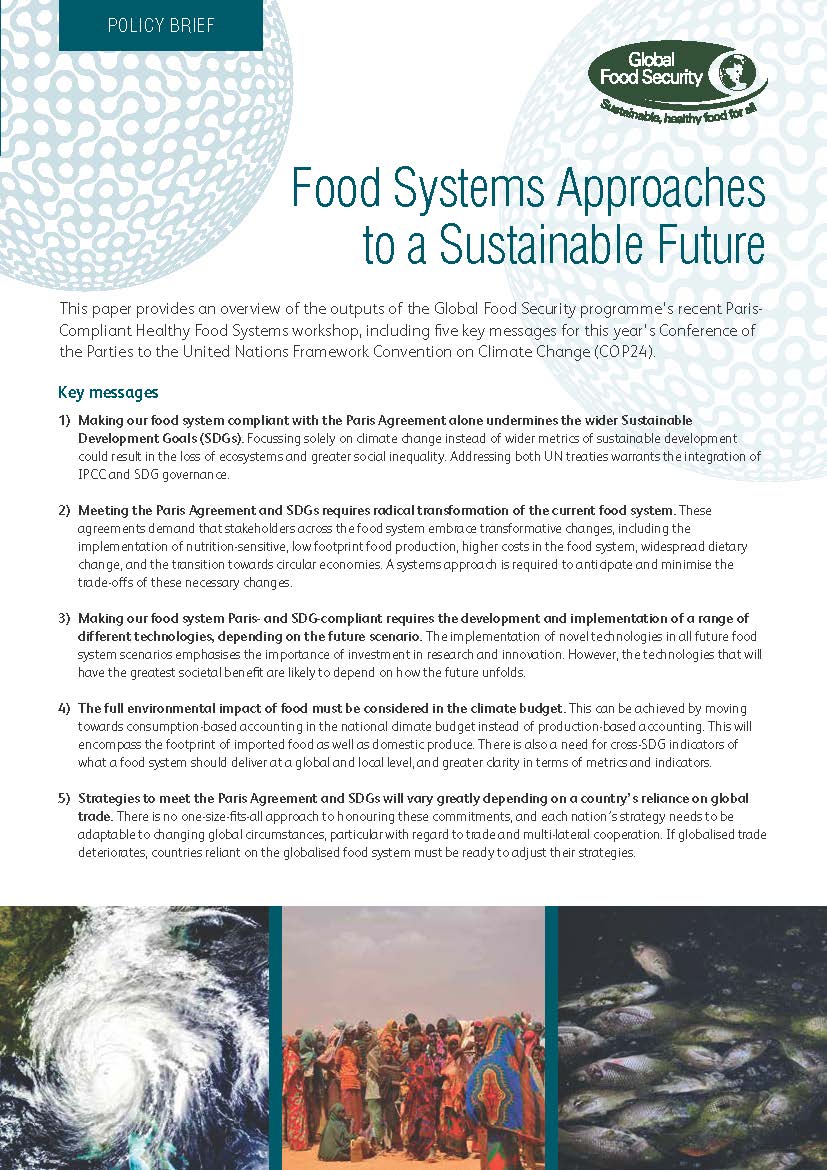The Global Food Security programme has published a policy brief ahead of the 24th Conference of the Parties to the United Nations Framework Convention on Climate Change (COP24), held in Katowice, Poland.
Climate change is already impacting our global food system by increasing the number and intensity of extreme weather events (PDF), with heatwaves and wildfires, catastrophic storms and floods, and crippling droughts. It is this very same food system that is also contributing to climate change, producing over 20% of global greenhouse gas (GHG) emissions and consuming 30% of global energy. This two-way relationship underlines the urgent need to reshape our food system to both limit its contribution to climate change and avoid its impact on food security in the future.
Published today, Global Food Security’s policy brief ‘Food Systems Approaches to a Sustainable Future’ conveys five key messages for COP24. It highlights the pivotal role the food system plays in meeting the Paris Agreement’s overarching goal of limiting global warming to 1.5˚C above pre-industrial levels.
Director of the Global Food Security Programme, Riaz Bhunnoo, said: “We’re excited to be sharing this policy brief in preparation for this important UN Convention. We have a role in providing thought leadership on food security challenges, and our report highlights key messages from leading experts drawing on the latest knowledge.”
Based on scenarios developed by the Global Food Security programme’s Paris-compliant healthy food systems taskforce, the policy brief warns that making GHG emissions the primary focus of our future food system could undermine the UN’s wider Sustainable Development Goals (SDGs).
Other key messages include the importance of technology in future food systems and the need for consumption-based accounting in the carbon budget. It calls for the radical transformation of our current food system through changing food production strategies, transitioning towards plant-based diets and drastically reducing food waste across the food system.
“Our food system ties into a myriad of global issues, ranging from climate change and dwindling natural resources, to the double burden of malnutrition,” said Riaz. “There will always be trade-offs, but taking a food systems approach can identify win-win scenarios, meeting both the Paris Agreement and the wider SDGs. We hope UN leaders will consider these key messages at the COP24 next week.”
The policy brief is available to download below.

Food systems approaches to a sustainable future
This policy brief conveys five key messages for this year’s Conference of the Parties to the United Nations Framework Convention on Climate change (COP24), based on the outputs of the Global Food Security programme’s Paris-compliant healthy food systems workshop. This document outlines why a food systems approach is required to meet the Paris Agreement and the wider Sustainable Development Goals, as well as to ensure future food security for a rapidly growing global population in the face of ongoing climate change.
(You can view PDF documents by downloading a PDF reader. We recommend using Google Chrome or Mozilla Firefox web browsers.)
Acknowledgements:
The future food system scenarios were developed by Professor Tim Benton (University of Leeds), Dr Pete Falloon (Met Office), Laura Wellesley (now at UNICEF UK) and Professor Aled Jones (Anglia Ruskin University), and will be released in a full report early next year.


